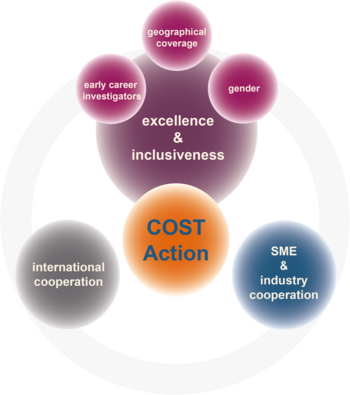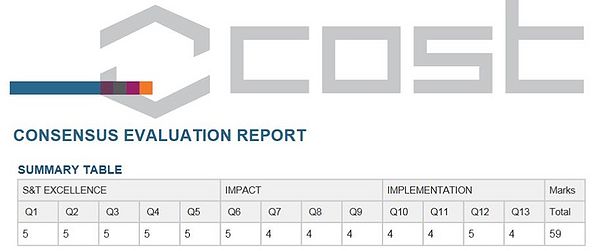| News and Events | Working Groups | Short-Term Scientific Missions | Management Committee | Members |
COST Action CA15203 (2016-2021): MitoEAGLE
Evolution-Age-Gender-Lifestyle-Environment: mitochondrial fitness mapping
COST Action MitoEAGLE
MITOEAGLE - how it flies
- This is the roadmap of the project; yet the expression "how it flies" belongs to EAGLE.
- The 1st Call for Short Term Scientific Mission is open for applications: » STSM MITOEAGLE - Call for STSM Applications
- » Upcoming MITOEAGLE Events
- 2017-03-21 to 2017-03-23 Barcelona (ES) Management Committee Meeting, WG Meetings
- 2016-11-15 to 2016-11-17 Verona (IT) First Core Group Meeting, WG1 and WG4 Meeting
- Grant periods
GP Start Date End Date 1 2016-11-01 2017-04-30 2 2017-05-01 2018-04-30 3 2018-05-01 2019-04-30 4 2019-05-01 2020-04-30 5 2020-05-01 2020-09-11 (end of the Action)
MITOEAGLE track record
Approval and Memorandum of Understanding
- 2016-09-12 Brussels (BE) Start of the COST Action CA15203 MITOEAGLE: »COST MC Meeting 2016 Brussels BE
- 2016-07-25 The Action Science Officer (SO) communicated the budget of the upcoming Grant Period (68,000 EUR: 2016-11-01 to 2017-04-30) to the Action Proposer. »More details.
- 2016 Jul 07-13 The MitoFit Science Camp 2016 Kuehtai AT addressed key topics of the MITOEAGLE project and provided a key opportunity to prepare the 1st MC Meeting. » More details
- 2016-02-26 Memorandum of Understanding (MoU) published in e-COST:
- 2016-02-12 MITOEAGLE proposal approved » MITOEAGLE evaluation highlights
MITOEAGLE evaluation highlights
- The large number of proposers spread across many EU countries and employed in a range of sectors is an early indication of the relevance and timeliness of this study.
Highlights: The main strengths are
- The idea of establishing a standardized database of mitochondrial data, with continuous monitoring and updating of SOPs.
- The set up of data sets for mt-function for different tissues in a standardized format.
- The ambition to coordinate researchers whose research activity is focused on mitochondrial physiology, but that work in different fields.
- The will to go beyond the spirit of strong competition that characterized research on mitochondria.
- The proposal addresses the considerable lack of uniformity and consensus on standard operating procedures in the design and implementation of research protocols involving mitochondrial physiology. This is a very real problem that can only be solved through networks on a scale such as this Action, that will work to harmonise experimental protocols across research groups.
- The will to reach standardized protocols and ways of data presentation, that will allow an easy cross comparison of data; this aim has been reached in many other fields of research (e.g flow cytometry data, microarray analysis).
- The ambition to pool together data from different groups, in order to get the statistical power that could not be reached by single, small research groups.
- To the best of my knowledge, I cannot remember similar networks in Europe, in terms of dimensions and ambition.
- Several significant risks to the successful completion of the Action have been identified. These include the difficulty in standardising experimental protocols, variability in quality control standards and failure of the consortium to agree on specific standards.
- The breadth of membership that is already evident in this consortium underscores the importance and significance of the aims and objectives of this Action.
Highlights: Suggestions by reviewers
- The inclusion of a WP with specific responsibility for dissemination and training could be considered. - For example, the education programme for use of the MITOEAGLE data base could be the responsibility of the new WP.
- This Action will benefit from a more comprehensive analysis of its long term impact on European society; as an example, the proponents say that this Action will help to distinguish noise from truth in the field of mitochondrial biology: many "noisy data" on mitochondria and the process of aging, which has a crucial impact on the society and economies of Europe.
Comment of the Scientific Committee
- The proposed Action must develop and implement specific plans to increase the involvement of Early Career Investigators and for maintaining and monitoring gender balance.
Full Evaluation report
Submission
- 2015-09-08 MITOEAGLE proposal submitted
- » MITOEAGLE circulars
- A MITOEAGLE Session was integrated in the programme of MiP2015, 11th MiPconference on Mitochondrial Physiology, Luční Bouda, Czech Republic. 2015 Sep 07-11.
- 7th MiPschool on Mitochondrial Physiology, Cape Town, 2015 Mar 24-28: "Reaching the world". EAGLE was presented and discussed at the MiPschool Cape Town 2015 to make students aware of the fundamental importance of connecting mt-genomics and mt-proteomics with lifestyle-exercise-physiological data banks, where a ‘mitochondrial physiology data bank’ provides the missing link. For an introduction of EAGLE (starting with ‘Evolution’), there is no better continent than Africa.
- EAGLE was discussed at various meetings in 2014, including the World Congress on High Altitude Medicine and Physiology in Bolzano, Italy, the O2k-Workshop in Philadelphia, the UMDF meeting in Pitzburgh, US; EUROMIT in Tampere, Finland, EBEC in Lisbon, Portugal, MiP in Obergurgl, Austria, ASMRM in Taipei, Taiwan, and Stealth Mitochondrial Dysfunction Meeting in Miami, USA. Your input, evaluation and suggestions are most welcome. The following list, summarizing contacted colleagues and involved research groups, may expand rapidly. The MitoGlobal framework offers an Open Access/Open Innovation approach. - 2014-12-05 Gnaiger Erich
- » MITOEAGLE circulars
- 2015-09-08 MITOEAGLE proposal submitted
Selected COST terms
- COST Action
- means the COST pan-European networking instrument (such as MITOEAGLE) allowing researchers, engineers or scholars from COST Member Countries and Cooperating State to develop jointly their ideas and new initiatives in a field or topic of common interest.
- COST Actions are implemented through a set of networking tools such as meetings (MC meetings, Working Groups, workshops, conferences), Short-Term Scientific Missions (STSMs), Training Schools and Dissemination activities.
- COST Action
- COST Cooperating State
- Israel. Researchers from COST's Cooperating State enjoy member rights in COST Action participation.
- COST Cooperating State
- COST Member Countries
- » COST member countries - COST member countries in bold are represented in the COST MITOEAGLE consortium.
- Austria, Belgium, Bosnia and Herzegovina, Bulgaria, Croatia, Cyprus, Czech Republic, Denmark, Estonia, Finland, France, Germany, Greece, Hungary, Iceland, Ireland, Italy, Latvia, Lithuania, Luxembourg, Malta, Montenegro, Netherlands, Norway, Poland, Portugal, Romania, Serbia, Slovakia, Slovenia, Spain, Sweden, Switzerland, Turkey, United Kingdom and the former Yugoslav Republic of Macedonia.
- COST Member Countries
- COST National Coordinator (CNC) - »COST
- means the individuals appointed by the COST Member Countries and Cooperating State in charge of confirming the acceptance of the Action Memorandum of Understanding and responsible for nominating the Management Committee members of their country and the evaluators for the Review Panels pool of Experts.
- COST National Coordinator (CNC) - »COST
- Dissemination
- means the public disclosure of COST Action’s results and/or outcomes by any appropriate means (other than resulting from protecting or exploiting the results), including by scientific publications in any media.
- COST Actions shall favour Open Access to results and outcomes published thanks to COST funding. Specific provisions linked to the management, sharing or exploitation of Intellectual Property that may rise from a COST Action shall be defined by the respective Action participants, and lies within their sole discretion/responsibility.
- Dissemination
- Early Career Investigator (ECI)
- means a researcher in the time span of up to 8 years after the date of obtaining the PhD/doctorate (full-time equivalent). Periods of career leave have to be added to this time span (see ESR in COST gloassary).
- Early Career Investigator (ECI)
- Grant Holder
- means the legal entity responsible for the administrative and financial implementation of the COST Action. The Grant Holder for MITOEAGLE is the Medical University Innsbruck.
- Grant Holder
- Inclusiveness Target Countries (ITC)
- Countries in bold are represented in MITOEAGLE:
- Bosnia-Herzigovina, Bulgaria, Cyprus, Czech Republic, Estonia, Croatia, Hungary, Lithuania, Latvia, Lusembourg, Malta, Montenegro, Poland, Portugal, Romania, Slovenia, Slovakia, the former Yugoslav Republic of Macedonia, Republic of Serbia, Turkey
- Inclusiveness Target Countries (ITC)
- Management Committee (MC)
- Participant - Action Participant
- means any researcher, engineer or scholar who participates actively in a COST Action.
- The reimbursement of expenses incurred by participants, other than those incurred by the MC Members, depends on the fulfilment of the COST eligibility criteria for reimbursement and is always subject to the availability of COST funds.
- Researchers from Near Neighbour Countries are eligible for reimbursement, whereas researchers from International Partner Countries are not.
- Participant - Action Participant
- Short-Term Scientific Missions (STSM)
- These Missions (Inter-laboratory Exchange Visits) aim at strengthening the existing COST Actions by allowing scientists to go to an institution or laboratory in another COST country to foster collaboration, to learn a new technique or to take measurements using instruments and/or methods not available in their own institution/laboratory. They are particularly intended for Early Career Investigators.
- Short-Term Scientific Missions (STSM)
- Working Groups (WG)
- The scientific work of the Actions is organised through Working Groups. - Four Working Groups in MITOEAGLE.
- Working Groups (WG)





